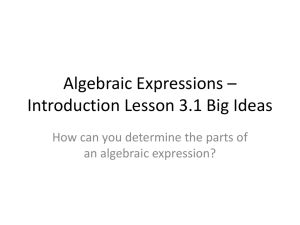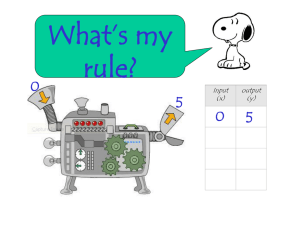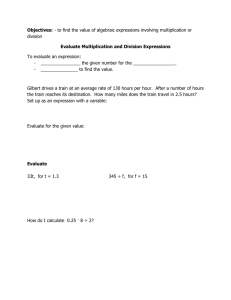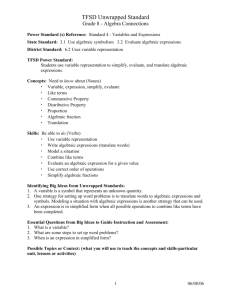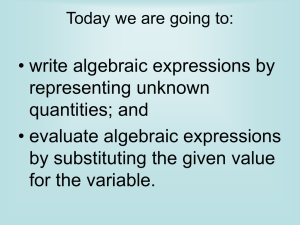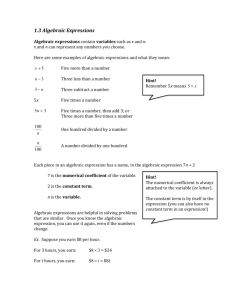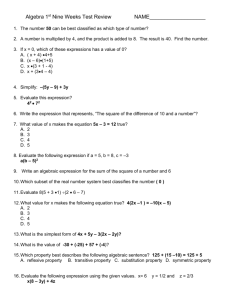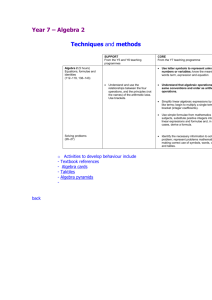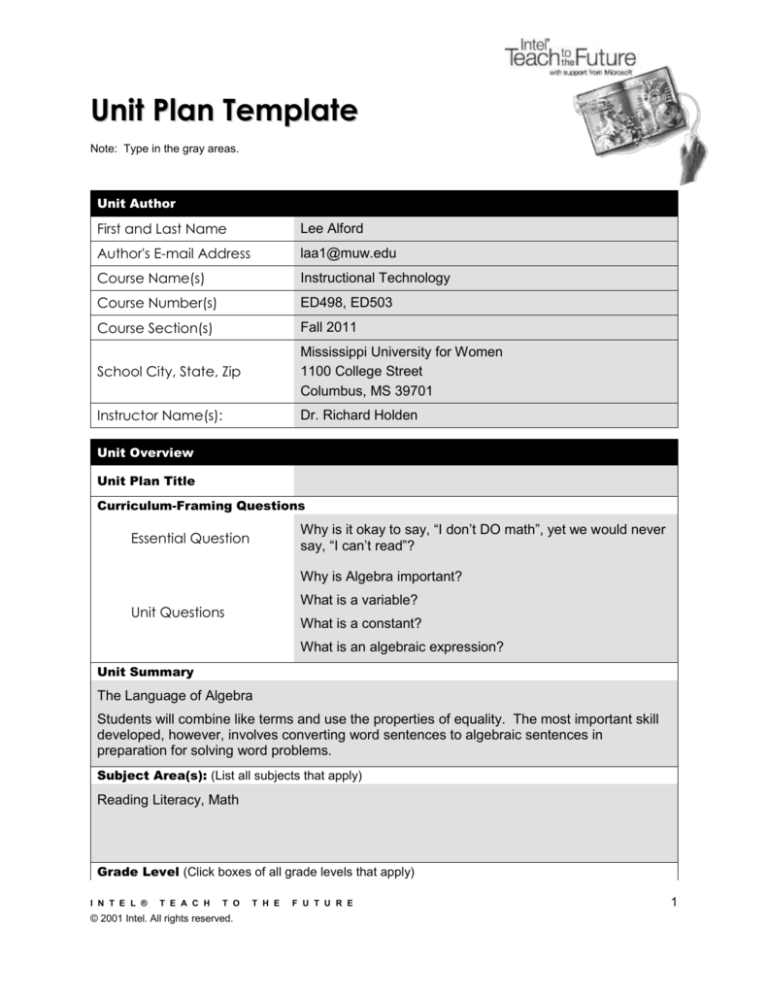
Unit Plan Template
Note: Type in the gray areas.
Unit Author
First and Last Name
Lee Alford
Author's E-mail Address
laa1@muw.edu
Course Name(s)
Instructional Technology
Course Number(s)
ED498, ED503
Course Section(s)
Fall 2011
School City, State, Zip
Mississippi University for Women
1100 College Street
Columbus, MS 39701
Instructor Name(s):
Dr. Richard Holden
Unit Overview
Unit Plan Title
Curriculum-Framing Questions
Why is it okay to say, “I don’t DO math”, yet we would never
say, “I can’t read”?
Essential Question
Why is Algebra important?
What is a variable?
Unit Questions
What is a constant?
What is an algebraic expression?
Unit Summary
The Language of Algebra
Students will combine like terms and use the properties of equality. The most important skill
developed, however, involves converting word sentences to algebraic sentences in
preparation for solving word problems.
Subject Area(s): (List all subjects that apply)
Reading Literacy, Math
Grade Level (Click boxes of all grade levels that apply)
I N T E L ®
T E A C H
T O
© 2001 Intel. All rights reserved.
T H E
F U T U R E
1
K-2
6-8
ESL
Gifted and Talented
3-5
9-12
Resource
Other:
Student Objectives/Learning Outcomes
1. Evaluate expressions containing variables.
2. Use formulas.
3. Combine like terms.
4. Give examples of the properties of equality.
5. Change word problems to algebraic expressions and equations.
Targeted State Frameworks/Content Standards/Benchmarks
NUMBER AND OPERATIONS
1. Understand relationships between numbers and their properties and perform
operations fluently.
a. Apply properties of real numbers to simplify algebraic expressions, including
polynomials. (DOK 1)
b. Use matrices to solve mathematical situations and contextual problems. (DOK 2)
ALGEBRA
2. Understand, represent, and analyze patterns, relations, and functions.
c. Analyze the relationship between x and y values, determine whether a relation is
a function, and identify domain and range. (DOK 2)
Procedures
1. To identify and differentiate variables and constants in an algebraic expression.
2. To translate basic English phrases into algebraic expressions.
3. To evaluate an algebraic expression given values for the variables.
4. To identify terms and like terms in an algebraic expression.
5. To simplify an algebraic expression by combining like terms.
6. To simplify algebraic expressions by removing grouping symbols.
7. To apply formulas, given values for the variables.
8. To determine if an equation is true or false.
9. To recognize the properties of equality.
10. To translate word sentences into algebraic equations.
I N T E L ®
T E A C H
T O
© 2001 Intel. All rights reserved.
T H E
F U T U R E
2
Approximate Time Needed (Example: 45 minutes, 4 hours, 1 year, etc.)
Ten classes, 1 hour for each class.
Prerequisite Skills
All students should have completed grades K – 7 math skills and be familiar with the use of
Integers and the Real Number System.
Materials and Resources Required For Unit
Technology – Hardware (Click boxes of all equipment needed.)
Camera
Laser Disk
Computer(s)
Printer
Digital Camera
Projection System
DVD Player
Scanner
Internet Connection
Television
VCR
Video Camera
Video Conferencing Equip.
Other: USB flashdrive
Technology – Software (Click boxes of all software needed.)
Database/Spreadsheet
Image Processing
Desktop Publishing
Internet Web Browser
E-mail Software
Multimedia
Encyclopedia on CD-ROM
Web Page Development
Word Processing
Other:
Textbook: Algebra I for Christian Schools, 2nd Edition
Pilger, Tagliapietra, & Kohler
Printed Materials
Bob Jones University Press
Greenville, South Carolina 29614
Supplies
Paper, pencils w/erasers (no pen), calculator (optional),
graph paper
Internet Resources
www.math.com, www.hotmath.com
Worksheets provided by teacher to extend student learning
to real life situations through the use of word problems
Others
Accommodations for Differentiated Instruction
I N T E L ®
T E A C H
T O
© 2001 Intel. All rights reserved.
T H E
F U T U R E
3
Resource Student
Tutoring sessions will be available by appointment and
during study hours two times each week with additional
worksheets and computer application problems.
Gifted Student
Students displaying solid knowledge of basic concepts will
be placed as team leaders for the weekly “math team
challenges”. Teams are comprised of differentiated
achievement levels and gender diversity. Students are
given ten unit related problems to complete in a specified
time. For each problem completed, teams receive one
point; for each correctly answered problem, teams receive
one point; and for each incorrect answer, one point is
deducted from each team. The winning team receives a
“free” homework pass for the nine week term. The gifted
students serve as leaders for their team and will receive a
free homework pass regardless of the team challenge.
Student Assessment
Multiple formative assessments will be utilized for the unit of study. Seating charts with use of
“tic” marks for class participation and discussion will serve as observational assessments. All
class and homework will be collected and returned daily. All quizzes and formal tests will be
kept in a student portfolio. A pre-test and post-test will be administered for the unit. Quizzes
and tests will include both objective and subjective questions and answers.
Page 4 of 4

